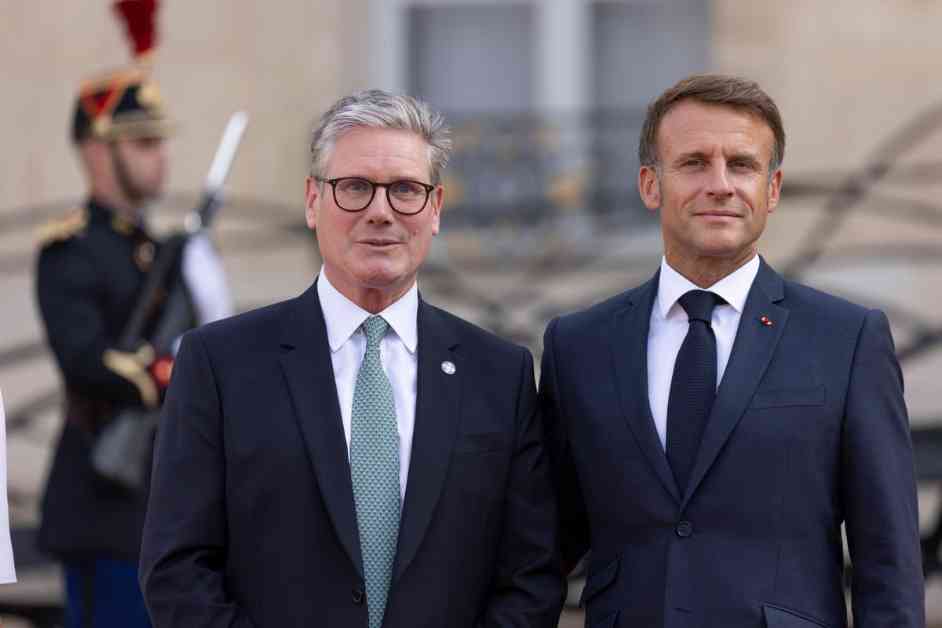**Starmer’s Fuel Duty Hike Fears and Outdoor Smoking Ban Updates**
**Keir Starmer’s Uncertainty on Fuel Duty Increase**
Sir Keir Starmer’s recent press conference in Berlin sparked concerns about a potential fuel duty hike as he refused to rule out a tax rise in the autumn Budget. While he reiterated his manifesto pledge not to raise income tax, National Insurance, or VAT, he remained noncommittal on fuel duty, potentially signaling the first increase since 2010. The prime minister is facing cabinet tensions following leaked government plans that reveal Labour’s intention to ban smoking in pub gardens, outdoor restaurants, and near football stadiums.
**Cabinet Tensions Over Stricter Smoking Rules**
Leaked government documents have unveiled Labour’s proposal for a stricter Tobacco and Vapes Bill, which includes banning smoking in various outdoor areas. The planned ban extends to pub gardens, outdoor restaurants, and areas near football stadiums, as well as outdoor spaces at clubs, universities, hospitals, and playgrounds. While the ban excludes private homes and large parks, concerns have been raised by the Business Department about potential financial strains on the industry. Despite cabinet tensions over the economic impact, Chief Medical Officer Chris Whitty supports the ban, emphasizing the health benefits and the significant cost smoking incurs on the Treasury.
**Industry Concerns Over Smoking Ban**
Hospitality industry chiefs have expressed apprehension over the proposed outdoor smoking ban, citing potential challenges for businesses. Michael Kill, chief executive of the Night Time Industries Association, voiced concerns over the impact of the ban on businesses already facing substantial challenges. He questioned whether the move towards stricter regulations could lead to a nanny state approach and highlighted the importance of considering the implications on the 6.4 million smokers in the UK who enjoy social smoking settings like beer gardens. The industry advocates for balanced measures that prioritize public health while also supporting business viability and personal freedom.
**Lib Dems Challenge Winter Fuel Payment Cut**
Liberal Democrat leader Ed Davey has announced plans to push for a vote on the government’s proposed cut to winter fuel payments. With all 72 Lib Dem MPs backing a motion to block the changes, concerns have been raised about the potential impact on pensioners facing rising energy costs. Age UK has warned that millions of pensioners could struggle to afford their energy bills, emphasizing the need to reconsider the decision to end the winter fuel allowance. Davey criticized the move as the government’s “first big mistake” and called for parliamentary debate and vote to address the concerns of affected pensioners.
**Starmer’s Diplomatic Engagements in Europe**
Sir Keir Starmer has been actively engaging with European leaders to strengthen ties and address post-Brexit challenges. His recent meetings with French President Emmanuel Macron and German Chancellor Olaf Scholz aimed to foster closer collaborations in various sectors including science, technology, development, business, and culture. The prime minister’s efforts to build bridges with European counterparts reflect a commitment to navigating the complexities of the post-Brexit landscape and forging mutually beneficial relationships for both Britain and its European partners.
**Support for Early Prisoner Releases**
The chief inspector of probation has acknowledged the risks associated with the government’s initiative to release thousands of offenders early to alleviate prison overcrowding. While the temporary scheme involves strict community supervision for around 5,500 offenders, concerns have been raised about the potential for reoffending due to the sheer number of early releases. Despite the challenges, the probation service is working to manage the influx effectively, recognizing the need for proactive measures to mitigate potential issues arising from the early prisoner releases.
**NHS Confederation’s Optimism on Smoking Ban**
Dr. Layla McCay of the NHS Confederation has expressed optimism about progress towards abolishing smoking, emphasizing the importance of addressing the leading cause of preventable illness in the UK. Highlighting the government’s commitment to tackling smoking-related health issues, she underscored the significance of moving towards a smoke-free future to reduce health inequalities and societal burdens. Dr. McCay acknowledged the necessity of making difficult decisions in the journey towards a healthier, smoke-free Britain, recognizing the long-term benefits of such measures for public health and well-being.
**Youth Mobility Scheme and Brexit Implications**
Germany’s ambassador to the UK has advocated for an agreement on youth mobility with the European Union, emphasizing its potential benefits for both British and European young people. Contrary to misconceptions, the youth mobility scheme is not related to migration but focuses on enhancing opportunities for young individuals to experience different countries for a limited period. The ambassador highlighted the mutual advantages of such agreements, emphasizing the potential for cultural exchanges and personal growth for young people in both the UK and the EU.
**Government’s Housing Delivery Acceleration**
The government has launched a dedicated team, the New Homes Accelerator, to expedite the delivery of housing and address planning system inefficiencies. With a goal of building 1.5 million homes, the initiative aims to support local authorities and developers in overcoming obstacles to housing construction. Planning experts will be deployed to potential housing sites to resolve issues and accelerate the building process, targeting sites with planning permission for up to 300,000 new homes. The government’s commitment to streamlining housing delivery reflects a proactive approach to meeting the increasing demand for affordable housing across England.
In conclusion, Sir Keir Starmer’s stance on fuel duty and the proposed outdoor smoking ban has sparked debates and concerns within the cabinet and industry stakeholders. As diplomatic engagements in Europe continue to shape post-Brexit relationships, the government’s initiatives on early prisoner releases and housing delivery underscore the ongoing challenges and opportunities in various policy areas. Amidst these developments, the need for balanced approaches that prioritize public health, economic stability, and societal well-being remains paramount in shaping effective governance and policy decisions.












